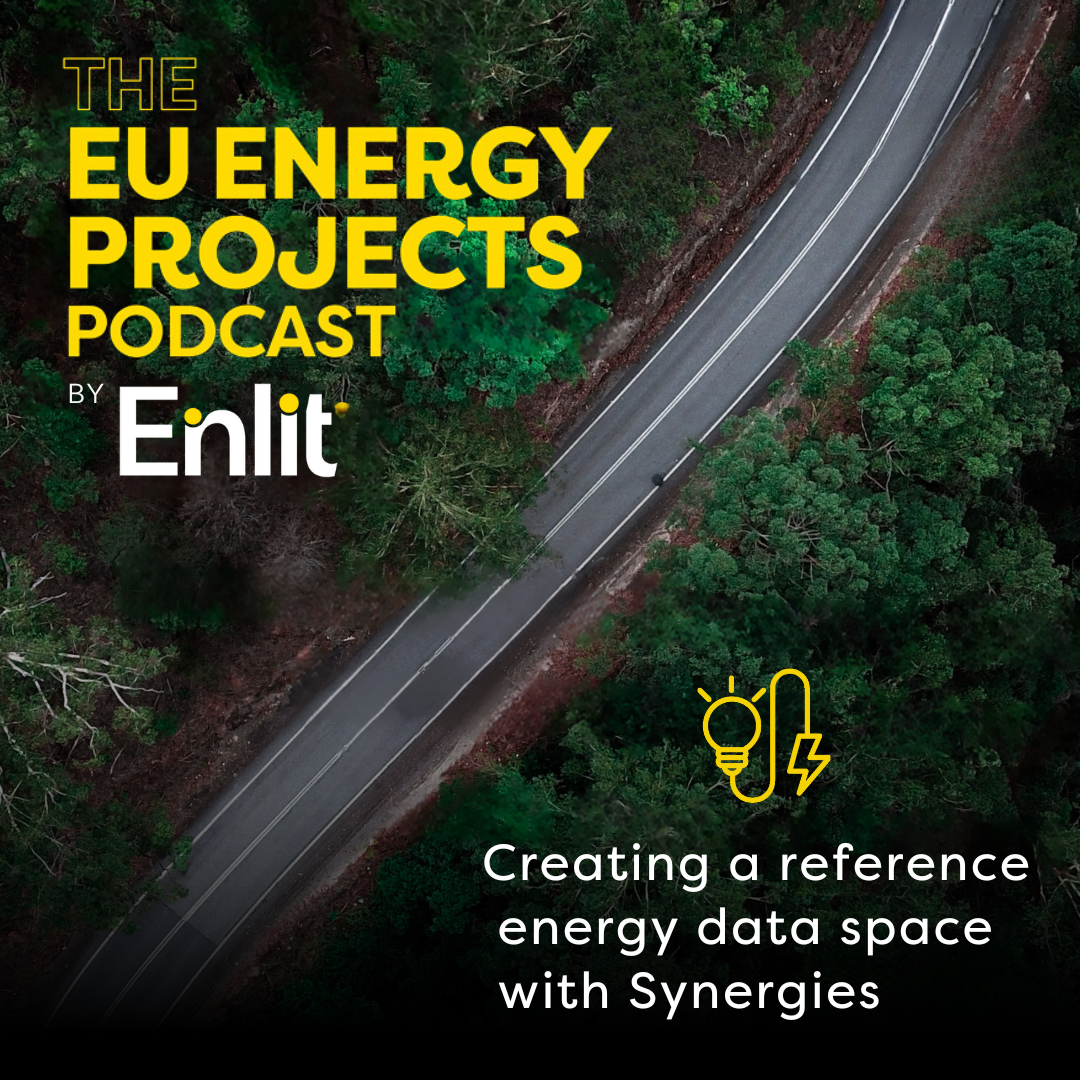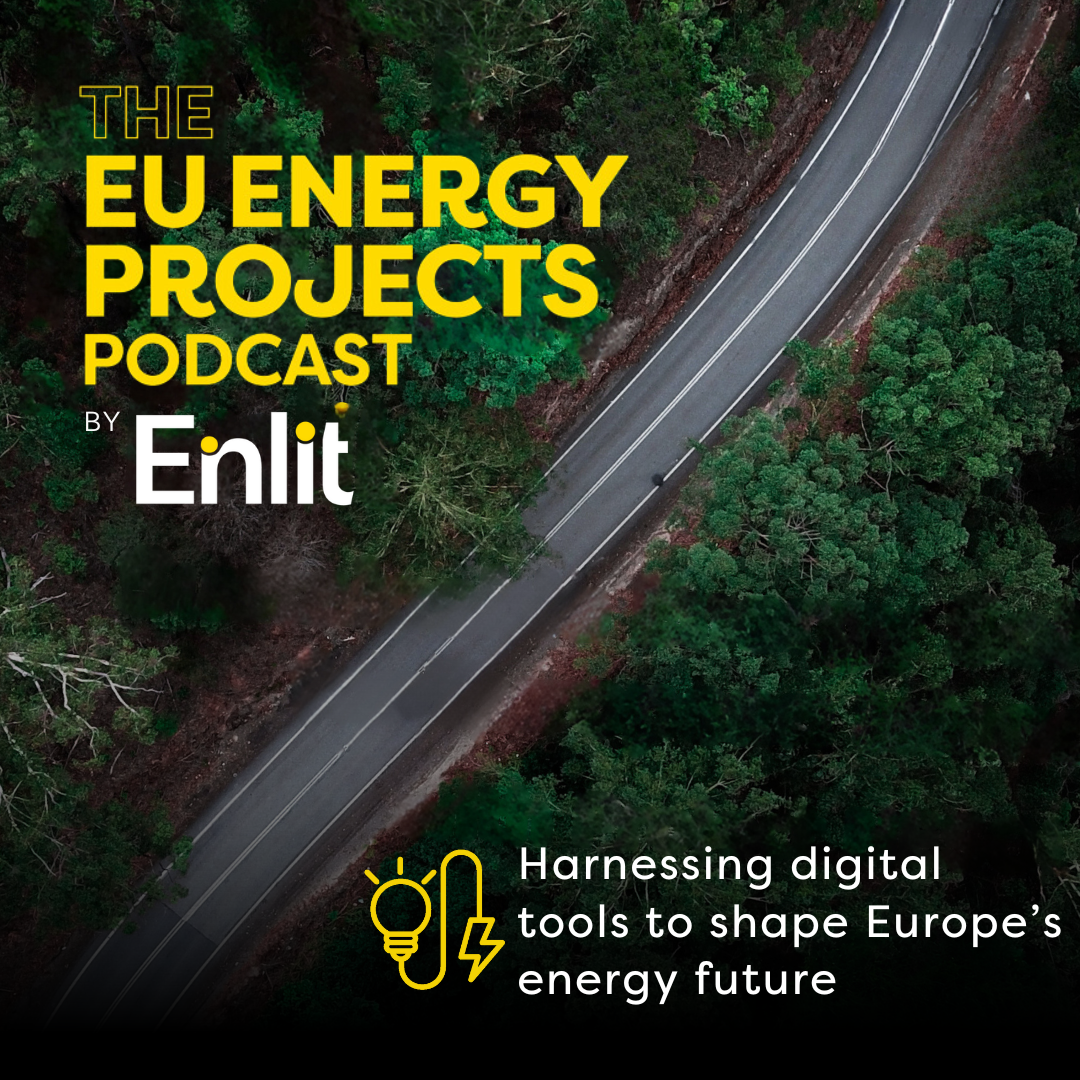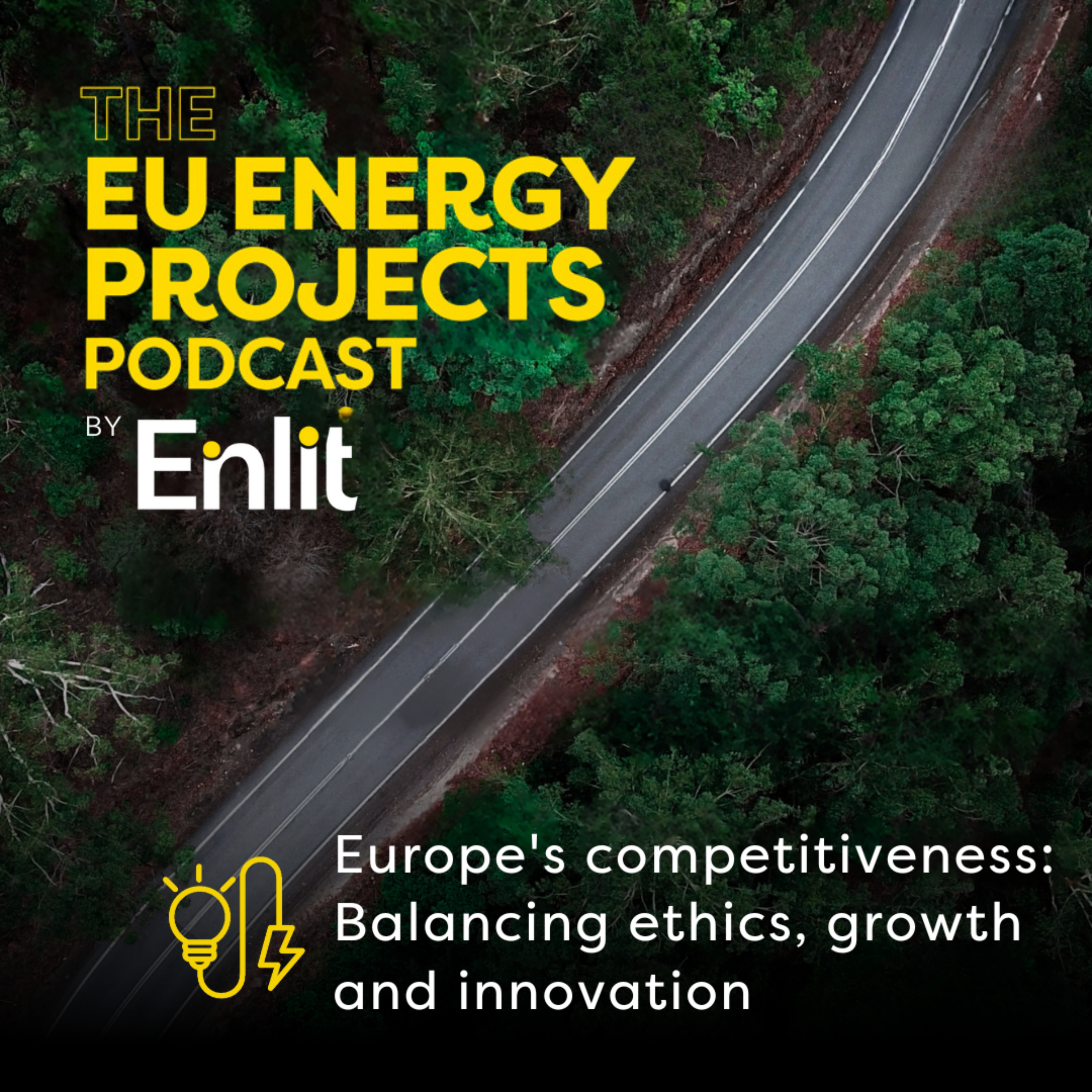Episode Transcript
[00:00:10] Speaker A: Welcome to the EU Energy Projects Podcast, a podcast series from Enlid and friends focusing on the clean energy transition for the European Union and the EU Commission funded energy projects that will help us achieve it. My name is Areti Daradimu, I am the editor of the EU Energy Projects Podcast and your host.
[00:00:35] Speaker B: As the European energy transition shifts towards a more decentralized system, the growing number of distributed energy resources connected to the network affects the accuracy and the physical models currently being used for operational monitoring and planning.
An integrated ecosystem of data value chains is needed to enable data driven optimization and coordination between energy sector stakeholders. Project Synergies aims to deliver a reference energy data space implementation that promotes innovation and the creation of an inclusive ecosystem of stakeholders across the energy data value chain by leveraging on an art of intelligence enabled digital solution. We're joined by Project Manager Tassos Tsitsanis.
Welcome to the EU Energy Projects Podcast and also Thassos. Welcome to Inlet Europe. Let's first unpack the energy data space concept and the overall goals of the Synergies project.
[00:01:37] Speaker C: First of all, thank you Ross for the opportunity to come here and speak about Synergies and the objectives and actually the results also that we have preliminary achieved. So what we need to have in mind. You talked about it before, but what we need to have in mind is that the overarching target and objective of our project is to mobilize this ecosystem of stakeholders around energy data. We are talking about this decentralized system, data generated across the edges of the system. So we need an intermediary somewhere in the middle to take care of all the interactions that are created not only in business terms but also in data terms. So we bring forward this reference, as you said, the energy data space implementation, it's a huge thing. It's not something simple. We need to take care of several aspects around data sharing that come not only from the technical point of view, but also from a regulatory compliance point of view and so on. That's why we are taking care of several issues and several aspects that we need to somehow address and tackle in order to make this work and work effectively. And more specifically, there are several challenges around interoperability, technical interoperability, semantic interoperability, especially in this. There are several data models, several protocols out there and across the energy domain that we need to harmonize.
[00:03:08] Speaker B: So let's stop for a second and talk about interoperability because the energy sector is characterized by diverse systems and protocols. So how does Synergies address interoperability to create a unified data energy space?
[00:03:22] Speaker C: It's really important to understand this landscape because we have an increasing number of stakeholders. And actually it's not only the traditional ones. We are used to talk about DSOs, retailers, energy communities. Right now there's a growing number of newcomers that are getting into the picture and I'm talking about SMEs, innovative technology providers and so on that need actually to communicate between them in an interoperable manner. All these come with the integration also of additional sectors like the building sector, the mobility sector, that we need to somehow integrate into the whole picture and into the whole energy system. And in this sense we need to understand first of all and landscape the standards and the protocols that are out there. We need to have a very good understanding actually and a very good picture of what is out there. And on the other hand, develop effective mechanisms to bring them together, harmonize, not reinvent the wheel, because we don't need yet another standard. We need to take advantage of what is out there and, and harmonize them effectively. And this is actually how we work. We are developing mechanisms that are complementing the pure data space technologies in order to facilitate in a no code environment. So not requiring a lot of effort or coding, let's say, from technical and data engineers, we are bringing together, we are offering these mechanisms in order to harmonize the different data models and somehow create a common language across the different stakeholders in order for all of them to have an understanding of the different aspects of the data that are to be shared.
[00:05:07] Speaker B: Okay, so that's behind the scenes, but this is all about empowering prosumers, right? So how does synergies aim to get prosumers to participate in energy markets and make informed decisions?
[00:05:25] Speaker C: Okay, this is one aspect actually of consumer empowerment, because in our book it's not only making informed decisions, but facilitating their participation in energy and market transactions. So on the one hand, of course, we need to educate consumers. We need to somehow create an understanding around terms like flexibility. What is flexibility, what is market transactions, what is peer to peer energy trading and so on. And in this sense we are developing, we are offering to them some artifacts and tangible artifacts. I don't prefer to call them applications because there are several applications out there, but they are actually artifacts that allow them to understand the constructs of their energy performance, to understand the constructs of flexibility, and somehow allow them to not take the informed decisions per se, but get into the details and understand what they can create as profit or as benefit out of the whole picture. And we need to adapt to the specificities and the specific requirements actually of each person. So some of them want to take the message, let's say from an environmental point of view, other from a monetary point of view. So we need to adapt and provide some personalized features in order to adapt to the context and to adapt to the requirements. On the other hand, we need to facilitate their involvement and be less intrusive to them. We do not expect each prosumer to be there all the time and when receiving a signal to activate a specific device in order to participate in ancillary services or flexibility provision to the grid. So we are utilizing, we are bringing forward the AI. We are trying to understand the behaviors, the performance, the needs of the prosumer and in this sense, having this knowledge, this internal knowledge, to take on the control of specific devices ourselves in order to facilitate their involvement and not somehow penalize them for not being there when the grid or the energy system requires them to be there and make an activation. So automation and intelligent automation is another way that we want to bring forward in order to further enhance consumer empowerment and participation in the energy transition, what we call it.
[00:07:56] Speaker B: So we're talking about individual prosumers, but individuals means data privacy. So how do we marry the concepts of data privacy and data sharing? Essentially, how do synergies ensure data privacy?
[00:08:11] Speaker C: We are taking a lot of steps forward in order to make sure that data privacy is, let's say, at the forefront of our offering. Because at the end of the day, we need to make sure that we deliver solutions that can make an impact to the market. So on the privacy side, we need to be compliant. Compliance is a very wide term, but there are specific regulations that are out there, like GDPR that put specific requirements and frameworks exactly. In order to safeguard actually this privacy around personal data. So there are specific services and specific mechanisms on our side in order to achieve the anonymization of consumer data. On the other hand, what we need to take into account is that anonymization is not a no regret option. We need to make sure that it's very well balanced with the utility of the data. So we always assess actually anonymization against utility. And at the end of the day, we want to ensure that the data, after being anonymized are not useless at all for any stakeholder that wants to make use of this data. On the other hand, we need to have in mind that it's not only prosumers that have this concern about data privacy, it's also the stakeholders themselves, because they are holding confidential data they want to control with whom they share this data and under what terms. So we promote also access control mechanisms in order for them to have full control with whom they share the data and under what conditions. On the other hand, there are stakeholders that have very strict requirements for the data not leaving their premises. So that's why in our book, federation is a term that we respect a lot and we invest a lot on this. And what we want to make sure is that we can address the needs of stakeholders that do not want their data to leave their premises. So apart from cloud deployments, apart from any kind of deployments that are, let's say, requiring an intermediary in the middle to handle and control the data sharing, we are promoting also the peer to peer data sharing with deployment of the data space of data space services at the servers and at the premises of all the stakeholders that are involved in this data ecosystem.
[00:10:49] Speaker A: Did you know that ENLIT has another podcast? The Energy Transitions Podcast is a broad ranging bi weekly podcast about the people accelerating the energy transition in Europe and beyond. You can find it on Spotify, Apple or wherever you enjoy your podcasts.
[00:11:10] Speaker B: Let's chat a moment about reaching the most number of people, because that's what we're trying to achieve here, right? And talking about how does synergies approach get scaled to accommodate, you know, the growing number of participants? And then second to that, each region is a bit different. So how do you replicate that across different regions that have different circumstances?
[00:11:32] Speaker C: Let's take it step by step because replication and scalability may be connected, but different things. On the scalability part, we do not have any kind of concerns because our technologies, let's say, can be scaled, let's say, without any technical implication getting into the middle. We have designed our technologies, we have designed our energy data space following the principles of security and scalability by design, in order to be able to address the evolving requirements of the energy system and the onboarding of as more as possible stakeholders involved in the energy value chain. Of course there are requirements that are coming with this, with the scalability needs. And these requirements actually refer to investments that need to be made on the stakeholder side in order to accommodate any kind of federated deployment that needs to be performed in order to safeguard again the security and privacy issues that come together with the data sharing aspects.
On the other hand, replication goes mostly on the business side of things. And by business side of things, I mean that there is an emerging need, at least on our side, for the promotion, not only as a technological offering, but also as a regulatory framework and governance Framework actually around data spaces, the promotion of data marketplaces. And by promotion of data marketplaces, what we need to take into account is that similarly to the way that energy markets work, we need to have clear rules about how this data market will operate at pan European level in order to avoid the specificities that are involved. When we go from member state to member state, we need to have common rules across the EU because we are talking at the end of the day for common European energy data spaces. And in this sense we need these clear rules to be there for the roles that will be involved in the operation of the, of the data marketplace, for the contracts that will be and need to be legally binding between the different markets and the remuneration of the different participants in the data transactions that are performed through the data space. And of course we, since we talked about prosumers, we need to have a clear definition of the ownership rights for the data that prosumers share through the data space, because again, in order to empower them, we need this data sharing of prosumer data to be performed through representation. So we need to have a very clear framework for the data ownership. And what happens. One, a data aggregator actually is getting into the game in order to take over the sharing of prosumer data on their behalf and the fair remuneration to them at the end of the day in a transparent manner.
[00:14:34] Speaker B: So we've discussed a lot about the challenges that you have to overcome, but obviously there is massive opportunity here to create a new economy and drive the energy transition forward. Let's unpack some of those economic benefits for individuals and other stakeholders.
[00:14:52] Speaker C: Indeed, and this is something that we are investing a lot actually, because at the end of the day we need to make sure that out of the technology development we do have some business models, some new business models that refer to data sharing and somehow facilitate the market penetration of the solutions and the overall model of data sharing around energy data. Sure, we have identified a lot of opportunities when it comes not to prosumers themselves, but to newcomers like renewable generators or whatever in sharing their data. Because the value that is created at the end of the day for the recipient of the data is such that allows, let's say, this data, this the value of the data actually to be not only reasonable, but really attractive in order to engage more and more participants into the game. And actually data owners and data providers have a lot of opportunities there because some of their data that were sitting in their databases or somewhere else can obtain some value, but the real value actually is coming for the recipients of the data because they access data that were previously non reachable. They create new value through AI and better understanding what is happening into their infrastructures and network. And they can optimize, they can significantly optimize their operations in a cheaper manner. And the example actually comes from network operators that get access to flexibility sources which at the beginning they can consider that data before being transformed or translated to flexibility. They can obtain access to cheap flexibility sources coming from the demand side in order to optimize and ensure the resilience of their infrastructures, of their grids through flexible network management. We have supported retailers to optimize their market positioning and avoid costly imbalance charges that come together with the limited accuracy they had when utilizing small portions of data that they had at their disposal. And of course we support prosumers in slashing their energy costs and on the other hand generating new revenues by getting them involved in flexibility transactions, which in several cases may be considered as really lucrative remuneration and support to the grid thassos.
[00:17:23] Speaker B: The benefits are very clear. Thank you so much for sharing your insights.
[00:17:27] Speaker C: Thank you Ross. It's my pleasure.
[00:17:31] Speaker A: You've been listening to the EU Energy Projects Podcast, a podcast brought to you by Enlite and Friends. You can find us on Spotify, Apple and the Enlite World website. Just hit subscribe and you can access our other episodes too. I'm Aretit Daradimu. Thank you for joining us.
[00:17:52] Speaker C: SA.




